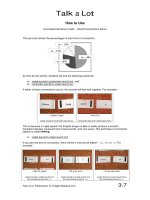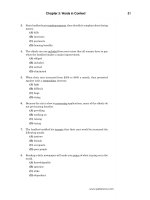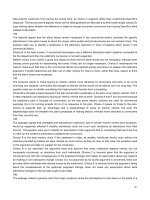Gmat exam sucess 5 ppt
Bạn đang xem bản rút gọn của tài liệu. Xem và tải ngay bản đầy đủ của tài liệu tại đây (83.03 KB, 6 trang )
Practice Your Computer Skills
On the GMAT computer-based test, you will need to know the following:
• how to use a mouse
• how to enter an answer
• how to move to the next question
• how to use a word processor (for typing your AWA essays)
• how to use the HELP function
The GMAC offers a free tutorial to help you become comfortable with the computer skills you will need for the
GMAT exam. You can download this software from the GMAT website at www.mba.com/mba/TaketheGMAT/
ToolsToHelpYouPrepare/GMATPrepProducts/GMATTutorialsSoftware.htm.
NOTE: The tutorial is not compatible with Macintosh
®
computers.
8
AWA essays. You are already under enough pressure to try to write two essays in an hour. If you are not com-
fortable typing, and if you do not know basic word-processing functions such as how to delete or move text,
you may have a difficult time writing a successful essay.
If you are not experienced with computers, then part of your GMAT exam preparation time must
include learning computer skills. Here are some specific tips to help you improve your computer skills to reach
peak performance on the GMAT exam:
■
Practice using a mouse. Get comfortable with the movement of the arrow and clicking around on the
computer screen.
■
Learn how to move up and down a page. Practice using the scroll bar and the arrow keys.
■
Get a typing tutorial. You can learn proper hand and finger positions that will help you type faster. One
website that offers help is www.typing-tutorial.com.
■
Learn to highlight, delete, and copy and paste text within a document. Get comfortable with the back-
space, delete, and arrow keys so you can move around quickly within a document. Practice typing and
changing text so that you can be sure not to delete text that you want to keep.
■
Practice typing your essay on the computer. Use the sample topics listed in Part III and on the GMAT
website at www.mba.com/mba/TaketheGMAT/Tools/AWATopics2001.htm. Set a timer so you get used
to the 30-minute time limit.
The GMAC offers its own GMAT computer tutorials to help you develop the computer skills you need
for the exam. You can download these tutorials at www.mba.com/mba/TaketheGMAT/ToolsToHelpYouPre-
pare/GMATPrepProducts/GMATTutorialsSoftware.htm.
9
How the GMAT Exam Is Scored
Your GMAT score report will actually include four scores: a Verbal section score, a Quantitative section score,
a Total score, and an AWA score. Your report will show these scores for the three most recent exams within
the last five years. It will also include information you provided to the GMAC, including your gender, date
of birth, Social Security number, undergraduate institution, major, date of graduation, and intended area of
graduate study.
Verbal and Quantitative Scores
Your Verbal and Quantitative section scores will range between 0 to 60. This number will be computed based
on a formula that considers the number of correct answers, the number of incorrect answers, the number of
questions answered, and the level of difficulty of the questions answered.
Because the questions on the Quantitative and Verbal sections are weighted, answering a difficult ques-
tion correctly will count more than answering an easy question correctly. That is why it is so important, as
we noted earlier, to answer the first few questions correctly to help set a higher level of difficulty for your exam.
In the Quantitative and Verbal sections, your score is determined by:
■
how many questions you answer
■
how many of those questions you answer correctly
■
the level of difficulty of each question you answer correctly
Total Score
The Total score is a combination of your Verbal and Quantitative scores scaled to a range between 200 to 800.
According to the GMAC, two-thirds of GMAT Total scores are between 400 to 600.
On Your Score Report
Your official GMAT score report will include four scores:
SCORE RANGE
Verbal 0–60
Quantitative 0–60
Total 200–800
AWA 0–6
AWA Score
Both of your AWA essays will be scored holistically by two separate readers on a scale of 0 to 6. This means
that readers will rate each essay based on its overall effectiveness, not just its grammatical correctness. Specif-
ically, readers will be looking for the following:
■
the level of critical thinking evident in your ideas
■
effective organization
■
sufficient development of ideas
■
strong and sufficient support of ideas
■
effective word choice and sentence structure
■
clear and controlled sentences
■
a command of the conventions of standard written English
An important note about your readers: One reader will be a college or university professional specially
trained to assess GMAT essays. The other reader, however, will probably be a computer. Since 1999, GMAC
and the ETS have been using E-rater® to score GMAT essays. E-rater is a program that evaluates essays based
on organization, word choice, sentence structure, and other key factors. You will learn more about E-rater and
the scoring of the AWA in Chapter 14. At this point, you can be comforted by this fact: According to the
GMAC, E-rater and human readers give essays the same rating, on average, 87% to 94% of the time.
If a discrepancy of more than one point appears between the two readers, your essay will be read by a
third independent reader
—
a human.
Once both essays are scored, the numbers will be averaged to determine your AWA score. Here is an
example:
READER 1 READER 2 READER 3 AVERAGE
Analysis of an Issue 5 5 N/A 5
Analysis of an Argument 2 4 3 3
AWA Score 4
When to Expect Your Score
You will receive unofficial Verbal, Quantitative, and Total scores at the completion of your GMAT CAT. You
can expect to receive official Verbal, Quantitative, and Total scores along with your AWA score via mail approx-
imately two weeks after your exam.
Canceling Your Score
At the end of your exam, but before you see your unofficial Verbal and Quantitative section scores, you will
have the opportunity to cancel your test scores. If you opt to cancel your scores, the schools you selected to
receive your score report will receive a cancellation notice, and the cancellation will be noted on all future score
– ABOUT THE GMAT EXAM–
10
If you answer all of the questions in each multiple-choice section, your final score will not be the percent of the
75 questions you answered correctly. That is because the questions are weighted and because not all of the
questions are scored. Several questions in the test bank are included for research purposes only. The ETS
includes these questions to determine whether a new question for a future exam is sufficiently clear.
Do not bother trying to figure out which questions are “real” and which are research questions. Just assume
all questions are “real” and do your best on all of them. The time allotted for each section is designed for you
to answer 75 questions total, and your score will be based only on your answers to the active test questions.
So don’t worry; a few research questions on your exam will not hurt your score in any way.
Does Every Question Count?
11
reports. Once you cancel, you cannot reinstate your scores. Once you view your scores, you cannot cancel.You
should therefore be very confident that you performed poorly on the exam before you elect to cancel your
scores. Please note that your testing fee will not be refunded if you cancel. After all, you did take the exam.
If you decide not to cancel, you can then see and print your unofficial Verbal, Quantitative, and Total
scores. You will receive an official score report in approximately two weeks, as mentioned previously. The insti-
tutions you selected should also receive your scores at approximately the same time.
Appealing Your AWA Score
As detailed as the AWA scoring rubric may be for human readers, rating an essay is inherently subjective and
certainly far more subjective than scoring a multiple-choice exam. Although E-rater may be successful, it is
possible for a highly effective essay (especially if it is unconventional) to receive a low E-rater score. If you
believe that your AWA essay(s) merits a higher rating, you may ask the ETS to rescore your essays for a fee of
$45. Your request must be made within six months of the date you took the exam.
Be aware, however, that you should request a rescore only if you are very confident that your essay did
not receive the score it deserved. Your rescored results are final, whether they are better or worse than your
original score, and you cannot request another rating. Your revised score will be sent to you and the institu-
tions that received your original score report approximately three weeks after your rescoring request is
received.
To request a rescoring, you must write, call, or fax the following address/numbers with your name, date
of birth, GMAT appointment/registration number, Social Security number, and the reason you feel your essay
should be rescored:
Phone: 609-771-7330
Fax: 609-883-4349
Mail: GMAT Rescoring Service
Educational Testing Service
P.O. Box 6102
Princeton, NJ 08541-6102
Getting Your Scores to Schools
Of course, the reason you are taking the GMAT test in the first place is to get your scores to the schools to
which you will apply. Your testing fee includes the cost of sending your score report to up to five schools. You
can select these schools on the day of your scheduled exam. Before your test, make sure you get the four-digit
institution codes for those schools and bring those codes with you to the testing center. Make sure you have
the right code for each program; large colleges and universities may have different codes for separate schools
within the system.
If you want to send your report to more than five schools, or if you want to add a school after your test
day, you can do so for an additional $25 per school. Print a copy of the Additional Score Report Request Form
from www.mba.com or call 800-GMAT-NOW to request this form. You can submit the form by phone, fax,
or mail:
Phone: 609-771-7330
Fax: 609-883-4349
Mail: GMAT
Educational Testing Service
P.O. Box 6104
Princeton, NJ 08541-6104
Your score report will be sent to the new recipient within approximately two weeks from when ETS
receives your request.
Retaking the Exam
If you are not satisfied with your scores or think you can do better with a little more study or practice, you
may retake the GMAT exam
—
in fact, you may retake the exam up to five times in any given year, as long as
you do not take the test more than once a month.
When you arrive to retake the GMAT exam, you can select the schools you want to receive your new test
scores. Your score report to these institutions will include the score report from your most recent exam and
those from the dates from your two most recent previous exams (if applicable) within the last five years.
If for some reason you want to take the test more than five times in a year, you may appeal to the GMAC
in writing. Your letter or e-mail should explain why you want to take the exam more than five times; the dates
and locations of your previous exams; and your full name, address, phone number, and fax/e-mail if avail-
able. Mail or e-mail this request to
– ABOUT THE GMAT EXAM–
12
Because you will be familiar with the format and content of the GMAT exam after you take the exam, chances
are you can significantly improve your score if you retake the test. According to the GMAC, most people improve
their Total score by approximately 30 points the second time they take the exam. So, if you take the test, study
the material you realized you did not know well enough during the exam, and then retake the GMAT exam, you
should be on your way to a significantly higher score.
But do not plan on gaining another 30 points by taking the test a third time. GMAC statistics show that score
improvements are typically much lower after the second exam.
Should You Retake the Test?
13
E-mail: fi
Mail: GMAT Fifth Testing Request
Graduate Management Admissions Council
Suite 1100
1750 Tysons Boulevard
McLean, VA 22102
GMAT Testing Center Rules and Regulations
Like all standardized tests, the GMAT exam must be taken under very specific conditions that are standard
for all testing centers. Because everyone who takes the exam takes it under the same conditions, business
schools can feel more confident in comparing the GMAT scores of their applicants.
Test center regulations for the GMAT exam are numerous and very specific, and violation of the regu-
lations can lead to expulsion from the testing center and cancellation of your test scores. Read this section care-
fully to be sure that you do not inadvertently violate any regulations.
Present Valid Identification
When you sign in at the testing center, you must present valid identification. Each form of identification must
contain your name, a recent photograph, and your signature. An ID without all three elements is not accept-
able, with the following possible exception: Test administrators are authorized, under certain conditions, to
accept IDs that contain a physical description in lieu of a photograph. Your identification must contain the
following:
■
your name (use this name when you register; your ID and your registration name must match exactly)
■
a recent and recognizable photograph
■
your signature









